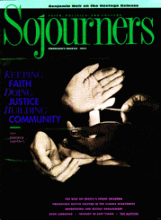The task of a biographer is sometimes enviable, and sometimes not. When the subject is an ordinary person who has been extraordinarily successful in living a life faithful to the peace witness of Jesus, biographers can expect an occasion of grace.
But trying to convey the complexity of such a life in the pages of a book is a formidable task, ripe with possible failure. What is compelling in the living, and even in the primary documents, can be lost or distorted in the telling. Building the Beloved Community: Maurice McCrackin's Life for Peace and Civil Rights, by Judith A. Bechtel and Robert M. Coughlin (Temple University Press, 1991, $34.95, cloth), is a biography in which little is lost and much is gained in the telling.
Emerging from a ministry in Cincinnati's West End in the middle 1940s, Rev. Maurice McCrackin is one of this century's finest examples of a hardy strain of American religious dissenters. With the eloquence of a committed and integrated life, McCrackin dissents from nuclear waste and wasted neighborhoods, from war and racial injustice, and from capital punishment and an inhumane prison system. Here is the story not only of his dissent, but of his tireless efforts to build the beloved community.
His advocacy on the part of the oppressed has not come without cost. Predictably, the state repeatedly jailed him. Somewhat less predictable, however, was his defrocking in 1962 by the Presbyterian Church. McCrackin recognized the triple evils of racism, militarism, and materialism; and he supplemented his progressive inner-city ministry with an absolutist position of refusing to cooperate in any way with the federal income tax system. This was more than his church community could bear.
Read the Full Article

